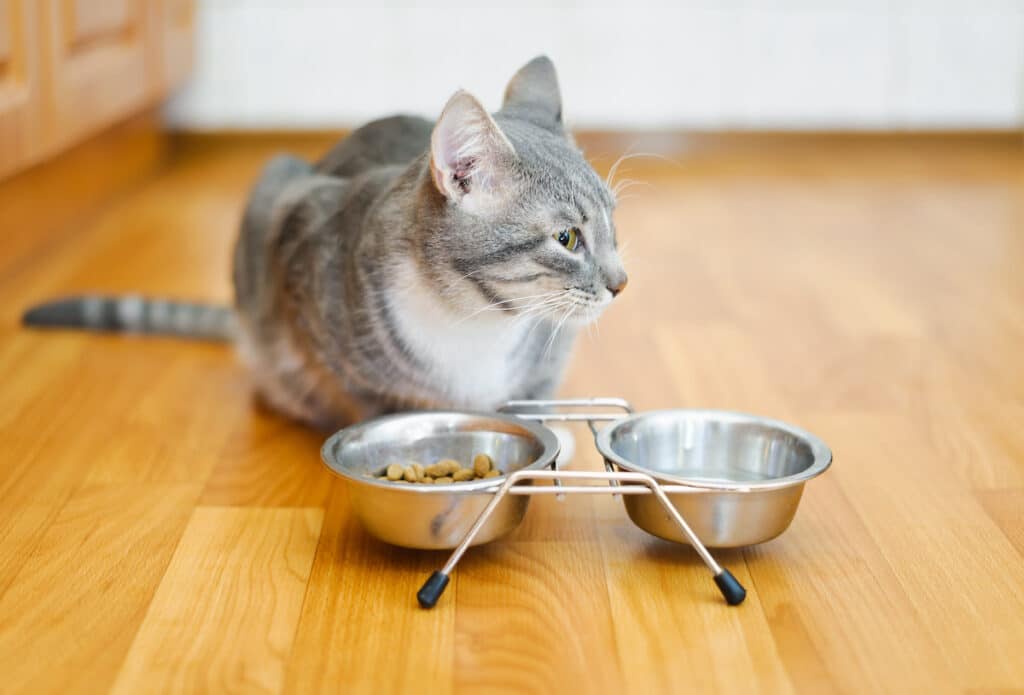Often, a cat will eat less than normal. This can be due to several factors, such as a change in diet, or a reduction in water intake. There are also a number of illnesses that can cause a cat to eat less. Some of these illnesses include: Cancer, Pancreatitis, Kidney failure, and depression.
Reduced water intake in cat’s bowl
Having an adequate amount of water in your cat’s bowl can help to prevent urinary crystals and maintain kidney function. Adequate hydration may also help to prevent megacolon and urinary tract infections. It is a good idea to check your cat’s water bowls often and clean them out regularly.
There is no evidence to indicate that cats prefer water bowls of a specific size or shape. Nevertheless, most cats have preferences.
There are some cats that prefer drinking from flowerpots or watering cans. Another group prefers to drink from leaky faucets. Several cats prefer water that is flavorful or bland.
A study conducted by Dr. Debora Lichtenberg found that a large majority of cat owners checked their cats’ water bowls daily. They also cleaned them out regularly.
Infections
Keeping your pet healthy is important, and a good question is, “What is the best way to help my cat recover from an infection?” Your vet can help you identify and treat the disease.
A respiratory infection is a common cause of loss of appetite, and should be treated promptly. This is especially true in kittens, who are susceptible to the disease. The signs of a respiratory infection include nasal congestion and discharge, which may be purulent. A cat’s sense of smell may also be affected.
The best way to help your cat recover from an infection is to take them to a veterinarian. Your veterinarian may prescribe medication to help combat the disease, which should be followed carefully to avoid a recurrence.
Kidney failure
Getting an accurate diagnosis is important for cats with kidney failure. Your vet will order urine tests and perform a complete physical exam. If necessary, he or she will order other tests, such as ultrasound or x-rays.
Some signs that a cat is suffering from kidney failure are decreased appetite and thirst, decreased energy, and lethargy. In addition, cats may show signs of discomfort when moving. They may also be averse to eating certain types of food.
Cats with kidney failure may also have a uremic odor, which is caused by a buildup of toxins in the blood. Other symptoms include vomiting and diarrhea. Eventually, kidney failure in cats can cause death.
Pancreatitis
Often, when you have a cat with pancreatitis, you will notice that they are eating less. This is a serious condition that affects cats and can cause life-threatening complications. If your cat has pancreatitis, you should seek veterinary care immediately.
Your veterinarian will perform a physical examination of your cat, and may perform a blood test. They may also conduct an ultrasound. An ultrasound can help your veterinarian see the pancreas. An ultrasound can also help your vet rule out other illnesses.
Your veterinarian may prescribe medications to control pain, nausea, and vomiting, and may administer IV fluid therapy to help your cat regain hydration. Your cat may need a feeding tube for some time.
Cancer
Whether your cat is suffering from cancer or another condition, it is important to make sure he or she is getting proper nutrition. This can help ensure a better quality of life and may even extend the life of the cat.
Cats often lose their appetite when they are not feeling well. When this happens, the owner should visit a veterinarian. The vet will make a diagnosis and may recommend a specific diet.
A low carbohydrate diet is a good choice for cats with cancer. The diet will reduce the fuel the cancer cells need. It will also provide more energy in the form of fats.
Depression
Keeping track of your cat’s well-being can be a challenge. However, there are a few things you can do to help your furry friend cope with life’s stresses.
The obvious first step is to monitor your cat’s behaviors. This will help you to detect a problem early on. If you have noticed changes in your cat’s behavior, you may want to schedule a trip to the vet.
Cats are very social animals. They can become depressed when they are exposed to stressful situations or events. This includes the loss of a loved one, a change in your cat’s routine, or a change in your lifestyle.














